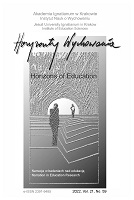Rola i znaczenie systemu edukacji dla kształtowania tożsamości narodowej w Republice Uzbekistanu
The Role and Importance of the Education System for Forming the National Identity in the Republic of Uzbekistan
Author(s): Katarzyna BrataniecSubject(s): Education, Museology & Heritage Studies, State/Government and Education, Identity of Collectives
Published by: Uniwersytet Ignatianum w Krakowie
Keywords: education system; islam; national identity; heritage; Republic of Uzbekistan;
Summary/Abstract: RESEARCH OBJECTIVE: The aim of this article is to present the complex relationship between Uzbekistan’s historical heritage, the creation of a national identity after the collapse of the USSR, and the construction of the education system based on a specific educational policy that misapropriates the Republic’s tradition of religious teaching. THE RESEARCH PROBLEM AND METHODS: Due to the issue raised, I used the historical- comparative method, which makes it possible to determine the changes that have taken place in the consciousness of societies over the centuries. In the case of Uzbekistan, it is the role of Islam and traditional Muslim upbringing in the survival of the Uzbek people during Soviet rule and after regaining independence, and rebuilding old ties with the Islamic world. The following research problem was formulated: Would it be possible to preserve the national identity of the Uzbeks’ national identity without maintaining the practice of teaching Islam? THE PROCESS OF ARGUMENTATION: The analysis of the problem of Muslim education in the context of contemporary “Uzbekness” includes a presentation of the origins of the Uzbek nation and the elements that constitute national identity, the role and significance of Islam for contemporary Uzbeks. RESEARCH RESULTS: The analysis shows that the negation of the return to values and the traditional living style based on religious teaching from an early age by the country’s authorities led to a serious internal conflict manifested in illegal religious education and the pursuit of the society to develop a grassroots Islam, uncontrolled by the state. CONCLUSIONS, INNOVATIONS, AND RECOMMENDATIONS: The Uzbek model of education presented in the article is an interesting example of the state control of religious teaching, different from the educational strategies in the Arab states representing the Islamic world.
Journal: Horyzonty Wychowania
- Issue Year: 21/2022
- Issue No: 59
- Page Range: 135-144
- Page Count: 10
- Language: Polish

